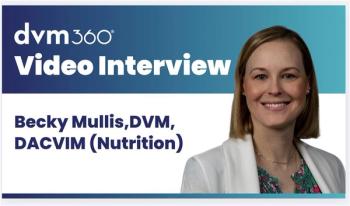
Drug law interpretation blindsides DVMs
San Diego - Most of California's 7,900 licensed veterinarians unknowingly break federal and state drug laws every day by allowing staff to administer controlled substances without immediate supervision, officials say.
An eye on compliance: CVMB's Sue Geranen stares down federal drug rules that call for immediate supervision; a step back for proponents lobbying to expand technician roles.
SAN DIEGO — Most of California's 7,900 licensed veterinarians unknowingly break federal and state drug laws every day by allowing staff to administer controlled substances without immediate supervision, officials say.
That monitoring level calls for DVMs to oversee the performance of tasks with a physical presence. Yet technicians have administered pain relievers, euthanasia solution and seizure medications with direct supervision for at least 30 years in California, not to mention across the United States. The legal breach recently was discovered when state regulators stumbled across the federal and state Controlled Substances Act while attempting to expand registered veterinary technician (RVT) job tasks.
By all accounts, the law, it's jurisdiction and impact on practices is confusing, to say the least. But California Veterinary Medical Board (CVMB) and California Veterinary Medical Association (CVMA) officials are attempting clarification and notification of practitioners. During an Oct. 18 hearing in San Diego at presstime, CVMB offered a legal opinion that spelled out the law as well as a plan to eventually change the restriction.
The bottom line: RVTs and registered assistants cannot administer controlled substances without immediate supervision. Anyone who breaks the law is subject to criminal prosecution, authorities say.
"If (Drug Enforcement Agency officials) came in and a veterinarian was administering under less than immediate supervision, that would be a violation; we would be forced to act," CVMB Executive Officer Sue Geranen says. "Ignorance of the law is not an excuse. We didn't know it, and we're concerned veterinarians don't know it. This is just an unbelievable issue that's come up. We understand what practitioners are facing."
Caught off guard
What seems unbelievable to practitioners like CVMA President Ron Faoro is that regulators failed to identify the law and related noncompliance by DVMs for at least two decades. Geranen chalks it up to a longtime oversight, and when Faoro studies the law, he almost understands how the rule could get lost in the current system.
The Santa Barbara practitioner describes the legal tangle as "extremely complex."
"You have to stare at it for a long time before it all comes together in your mind," he says "It really involves interpretation of several different sections of the practice act that are at odds with each other and the law."
To ignore it is to break it: CVMB's President Troy Roach and CVMA's Valerie Fenstermaker contemplate options at an Oct. 18 hearing on the issue. California's board outlined a plan to change the restriction.
Strictly speaking, the Controlled Substances Act is so restrictive it bars epileptic dogs from being boarded: "Staff members wouldn't be able to give phenobarbital without a veterinarian on the weekends," Faoro explains.
Yet after briefing his associates, he leaves the decision to enforce immediate supervision up to their discretion.
"My belief is everything ultimately rests with the licensing veterinarian," he says. "We've been violating the law for years, and it's never been an issue. Personally, I probably will do things under immediate supervision until the issues get clarified a bit. But sometimes all you can do is throw it out there on the table, and have the members decide for themselves."
Still, ignoring the law means breaking it, CVMA Executive Director Valerie Fenstermaker says, acknowledging: "What's been going on for many years is no longer applicable. It will obviously be a problem for most practices."
No quick fix
Cleaning up that problem comes down to opposing legal opinions stemming from CVMB and CVMA.
Two controlled substances acts exist, collectively known as the Uniform Controlled Substances Acts, which are nearly identical state and federal measures. Yet California leaders remain unclear about jurisdiction, citing confusion about whether a change to the state code in the practice act would trump the federal statute. Using advice from Department of Consumer Affairs attorney Shela Barker, who according to officials is not available for public comment, CVMB wants to try and amend the state statute via a regulation approved by inter-department channels that include a final stop at the state Attorney General's office.
CVMA officials say that's not enough. A law of this magnitude needs to be addressed legislatively and included in the California Veterinary Medicine Practice Act, they say.
Either way, the process will take at least six months to two years to run its course, officials say. And that doesn't mean the law ultimately will be changed.
National focus
In the meantime, CVMA and CVMB want to know how the rest of the country interprets and applies the federal statute, assuming most states allow direct and indirect supervision regarding the administration of controlled substances in veterinary practices.
Heather Hissom, executive secretary of the Ohio Veterinary Medical Licensing Board, says while she's aware of the Controlled Substances Act, it's language hasn't proved an issue.
"Our veterinary practice act permits indirect supervision of a technician, so the federal and state laws are in conflict," she says. From our perspective, we would enforce the state code, and we haven't any cases or investigations that have challenged it. I'm not sure how many veterinarians are aware of the federal law, but if it came down to it, they might be exposed."
Levels of supervision
Immediate supervision: There is a physical presence. The veterinarian who ordered the assigned task is watching the technician perform it.
Direct supervision: The veterinarian who has ordered the procedure is on the premises but not necessarily in the presence of the technician performing the job task.
Indirect supervision: The veterinarian has ordered the job task offsite to the technician with instructions.
Newsletter
From exam room tips to practice management insights, get trusted veterinary news delivered straight to your inbox—subscribe to dvm360.






